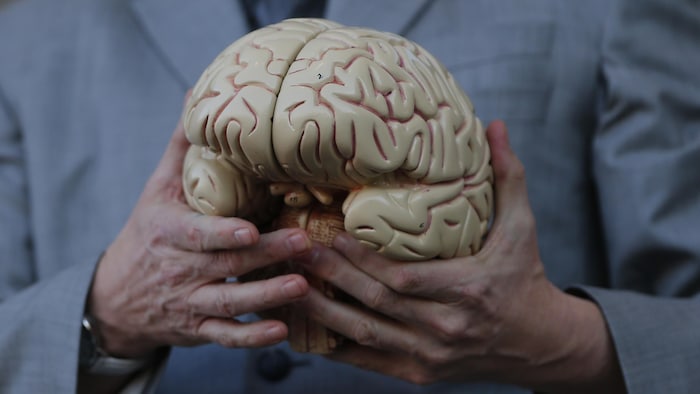Open in full screen mode At least a dozen pathogens, including SARS-CoV-2, causes post-infection syndromes. Speech synthesis, based on artificial intelligence, makes it possible to generate spoken text from written text. Scientific evidence regarding the long-term effects of COVID-19 continues to accumulate. Two new studies involving hundreds of thousands of people suggest that SARS-CoV-2 infection may cause cognitive declines. Researchers from Imperial College London (New window) recruited nearly 113,000 Britons previously infected with the COVID-19 virus for their study. These people engaged in various cognitive exercises to assess their memory and their ability to concentrate and pay attention. Their results were compared to those of people who had never been infected. The results, published in the New England Journal of Medicine, show that the coronavirus would harm cognitive abilities and intelligence quotient (IQ). Even people who had few symptoms initially performed worse than those who were never infected. In participants who recovered in less than a month (and who had mild symptoms during the active phase of infection), researchers noted an average loss of 3 IQ points compared to the never-infected group. This decrease is considered mild cognitive decline. In participants with long COVID (those with post-infection symptoms for three months or more), there was an IQ drop of approximately 6 points. Consult the complete file View full file FollowFollow Additionally, a 9-point decline was seen among people who required intensive care hospitalization. The largest declines were seen in people who experienced infection earlier in the pandemic (original and Alpha strain) before vaccines and antiviral treatments were available. Vaccinated people performed slightly better than unvaccinated people. Reinfected people performed slightly worse than people who were infected only once. Good news: Study suggests that the severity of cognitive decline appears to lessen in many people over time. Another study (New window), this time conducted among 134,000 people in Norway, also indicates that people infected with SARS-CoV-2 show cognitive declines. These were more pronounced depending on the duration of the initial infection. Participants who were older and with a higher body mass index showed slightly greater declines. If these cognitive deficits cannot all be caused by COVID-19, specify the authors, their results add to those of a growing number of studies which demonstrate that COVID-19 can cause physical and neurological after-effects. Additionally, this data validates the experience of thousands of people who report chronic symptoms like brain fog as well as loss of memory and concentration after infection. About 2.1 million adults in Canada, or about 7% of the adult population, are living with symptoms of long COVID, according to a Statistics Canada survey (New window) published in December 2023. < p class="StyledBodyHtmlParagraph-sc-48221190-4 hnvfyV">In France, (New window) public health authorities estimate that 4% of the adult population suffers from a post-COVID condition. In the United States (New window), at the end of June 2023, the prevalence of long COVID was estimated at 7.5% of all U.S. adults. As of March 2023, the prevalence in the UK (New window) was estimated at 3% of the total population. Researchers have not yet definitively established the underlying biological mechanisms of long COVID, but there are some hypotheses to explain the neurological symptoms. For example, studies have shown that infection can induce neuronal fusion (New window), which compromises neuronal activity. D Other studies have shown that COVID-19 can cause prolonged inflammation (especially in the brain) and accelerated aging of brain cells. This ongoing inflammation (New window) is believed to be caused by the presence of fragments of the virus hiding in the organs, long after infection. Another study (New window) calculated that the brain can lose up to 2% of its size, with less gray matter in the regions linked to smell and memory. Quebec researchers have shown that these neurological problems are caused by a dysfunction of the vascular system. Moreover, researchers (New window) found fragments of SARS-CoV-2 in brain tissue samples obtained during the autopsy of people with severe infection. As the world enters the fourth year of the pandemic, the authors of these studies write that their research raises many questions about the long-term effects of COVID-19 on the brain . How important are the effects of small cognitive deficits measured? Do they increase the risk of dementia later in life? What other factors could affect the cognitive scores of infected patients?, writes in an editorial (New window) Dr. Ziyad Al-Aly, chief of research and development at the VA St. Louis Health Care System and clinical epidemiologist at the ;University of Washington. And as SARS-CoV-2 continues to infect thousands of people every day around the world, these researchers fear that the number of people who will have long-term problems will continue to increase. This is why they advocate for more studies to be conducted on the cognitive effects of COVID-19 and the duration of measured cognitive declines. These observations warrant continued monitoring [of the long-term effects of the disease], write the authors of the UK study.
COVID-19: all about the pandemic
COVID-19: all about the pandemic
Cognitive declines after COVID-19 infection | COVID-19: everything about the pandemic

